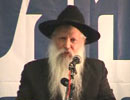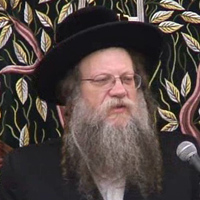- Sections
- Bemare Habazak - Rabbis Questions
585
Answer: Let us trace where what you heard about saying Aleinu with the tzibbur comes from and then try to apply it properly.
The gemara (Berachot 20b) says that the reason the mishnainstructs one who is impure and may not recite Kri’at Shema to "think about it" when others are reciting it is "so he should not be idle" at such a time. The Rosh (Berachot 3:14) says that the Behag says that for the same reason one who already recited Kri’at Shema and entered a shulin which they are reciting it should recite it again. The Shulchan Aruch (Orach Chayim 65:2) rules this way, explaining that "he should not look as if he does not want to accept the yoke of the Heavenly Kingdom with his friends."
The Magen Avraham (ad loc. 3) expands significantly on this idea, saying: "the same is true of other things that the tzibbur recites, e.g.,Tehilla L’David (Ashrei), that he reads with them, for this is derech eretz." A few things are not clear in this Magen Avraham. What is it about Ashrei specifically that makes it something that the tzibbur says (was it said aloud or in unison in his time?)? What else meets this criterion? What does he mean by derech eretz (is that the same as looking like not accepting)?
While it is unclear how he would answer the above questions, the Machatzit Hashekel (ad loc.), cited by the Mishna Berura (65:9) without dissent, says that the same is true of Aleinu. Rav Moshe Feinstein (Igrot Moshe OC III:89), without discussing Aleinu, gives guidelines for saying parts of tefilla along with the tzibbur. It is an obligation to answerdevarim sheb’kedusha (things that require a minyan) that do not have a set amount of times per day to say them. The derech eretz applies only to sections of praise of Hashem, not to sections that are supplication.

Bemare Habazak - Rabbis Questions (596)
Rabbi Daniel Mann
195 - Leaving Eretz Yisrael for a Trip
196 - Reciting Aleinu Along with the Tzibbur
197 - Whose Responsibility is it to Make a Proper Fence?
Load More
The fact that reciting Aleinu with the tzibbur comes from relatively late sources, is not unanimously held, and is described as derech eretzrather than an obligation, has an impact. There is a machloket whether the practice of reciting Kri’at Shema with the tzibbur justifies interruptingP’sukei D’zimra (opinions cited by Mishna Berura 65:11) or not (Shulchan Aruch, OC 65:2). Regarding Aleinu, which is of a lower level, halachic logic indicates that one should not stop during P’sukei D’zimraand certainly not during Shemoneh Esrei and Kri’at Shema and itsberachot (see Ishei Yisrael 26:14).
We, therefore, summarize as follows. If one is in the last parts ofdavening, he should interrupt what he is reciting, preferably at a good place to stop, to say Aleinu with the tzibbur. (If he is not up to the post-U’va L’tzion section of his tefila, he should repeat Aleinu when he gets up to its normal place – Tefilla K’hilchata 17:16.) If one is davening with a minyan that says Aleinu in a different spot than he is used to, he should say it as the tzibbur does (Ishei Yisrael ibid., despite some opinions to the contrary in Tefilla K’hilchata 17:(31)). If he is in a place indavening at which he may not stop, it suffices to bow like others at "…va’anachnu korim…" According to the aforementioned Aruch Hashulchan, this is always enough, and this is parallel to bowing when the chazan gets up to Modim and one is not in able to say Modim D’Rabbanan (Shulchan Aruch, OC 109:1).

White and Nice Clothes and Gold on Yom Kippur
Rabbi Daniel Mann | Tishrei 4 5780

Ask the Rabbi: Scratching Improperly Parked Cars
Rabbi Daniel Mann | Iyar 5785

Why Can’t Women Blow the Shofar for Men?
Rabbi Daniel Mann | 5772

A Renter’s Responsibility for an Exploded Water Tank – part I
Various Rabbis | Elul 22 5776
Tzeniut in the light of the Maharal
Adapted from Netivot Olam
Rabbi Eliezer Ben-Porat | 5771

The Halachot of Pidyon Haben
Rabbi Yirmiyohu Kaganoff | 5769
Hagala in Practice
Chapter Ten-Part Four
Rabbi Eliezer Melamed | 5775

Uva Letziyon, a Precious Prayer
Rabbi Yirmiyohu Kaganoff | Kislev 7 5776
Daf Yomi Makkot Daf 20
R' Eli Stefansky | 30 Nisan 5785
Daf Yomi Shevuot Daf 2
R' Eli Stefansky | 5 Iyar 5785

Not Just What You See is What You Get
Ayn Aya Shabbat v, 75
Rabbi Ari Shvat | Iyar 5785








